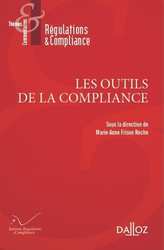RODA, Jean-Christophe🕴️
📝La compliance by design en antitrust : entre innovation et illusion, in 🕴️M.-A. Frison-Roche (ed.), 📕Les outils de la Compliance
pour lire cette présentation en français ↗️cliquer sur le drapeau français

► Full Reference: J.-Ch. Roda, "La Compliance by design en antitrust : entre innovation et illusion" ("Compliance by design in antitrust: between innovation and illusion"), in M.-A. Frison-Roche (ed.), Les outils de la Compliance, coll. "Régulations & Compliance", Journal of Regulation & Compliance (JoRC) and Dalloz, 2021, p. 257-266.
____
📕read a general presentation of the book, Les outils de la Compliance, in which this article is published
____
► Summary of the article (done by the Journal of Regulation & Compliance): It is a question of studying what seems to be the requirement of the European Commission to know an "antitrust compliance by design", which seems for the moment a rather confused idea but answering the hypothesis of violation of Competition Law through so-called "smart" technologies, for example aligning prices without intervention.
The Author takes up the solutions already identified, but he does not include the automatic internal reporting of a situation inciting anti-competitive behavior justifying greater vigilance on the part of the company itself because Compliance by design must, according to him, integrate the rules themselves and not just being a simple warning system. In the same way, the "transparency of algorithms" will make it possible in Ex Post to sanction those who have programmed or to consider their use as aggravating, which is not a mechanism by design in the strict sense, since this does not in itself produce respect for the rule.
In Competition Law, Compliance by design is therefore "the coding of the goals of Competition Law, with relatively simple instructions: do not set prices collectively, do not exchange a particular category of information" and block access to sensitive information. It could go further, towards a kind of education, the software "learning" to refuse to perform tasks leading to offenses. Law could incite this by a responsibility, which is in germ.
But the author believes that for the moment there are obstacles, not so much legal as technical. It is indeed necessary that lawyers and computer scientists understand each other ..., and therefore agree to think a little differently, and both. We can do it. But the complexity of Competition Law, associated with the margins of interpretation, are such, but their binary translation is almost impossible. In economic technology, the same pitfalls will be found, for example in the calculation of market power, determining in Antitrust Compliance by design. Not to mention the ethical aspect of Competition Law, which is difficult to encode.
________
comments are disabled for this article